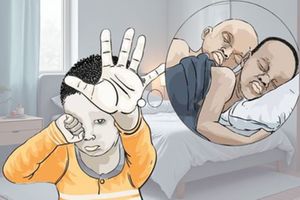
A few years ago, Nancy Wamalwa hired a therapist because she was slowly sliding into depression. Her children had just joined boarding school and all of a sudden she had a big home to herself, could cook and struggle to eat alone. Weekends and mornings were never the same. The morning chaos had turned into silence.
"It reached a point where I felt guilty enjoying weekend outings because I felt my children were suffering in school and I was having fun," she says.
When children go to boarding schools, parents and remaining siblings go through a mix of emotions and strategies for building a new chapter.
For Cecilia Muthoni, when she accompanied her son to his new school as he was joining Form 1, the mood was normal throughout the admission process until it was time to say goodbye.
“I couldn't hold myself together anymore. A tear dropped when I was hugging him. I couldn’t control my emotions. I cried,” she says.
“I cried all the way home. I cried for most of the evening, and the next day, my eyes were itchy.”
Cecilia has no idea how she will cope in the months until she sees her son again this week, as schools close for half-term holidays. She feels empty. Her role as a mother and a protector seems over.
“I felt like my role as a mother and protector was over. Surprisingly, my son was so excited to join a boarding school. He had waited for this day for so long. He never understood why I was devastated,” she says.
This is the challenge that many parents face as they dread the silence and empty bedrooms awaiting them when they reach home in the evenings.
“Saying goodbye never gets any easier. After admitting her to school, I felt like she needed me more, but I managed to fight back my tears,” says Faith Otieno.
The decision to send your child to boarding school can be a difficult one, and bidding them farewell for the first time can even be depressing. However, at some point in every parent’s life, the time comes when a child leaves home.
“It’s the sight of leaving her there, the empty seat in the car. It’s almost impossible not to feel like shedding tears, not knowing how she was going to cope in a strange land,” says Faith who together with her husband travelled from Migori County early this year to bring their daughter to Kenya High School in Nairobi.
“Yes, she is 14 years old, so hardly a young child, but will she cope? But I saw how happy and excited she was to be there, and I felt relaxed. One would think she has been a boarder all her schooling period," says Faith.
Depression
The pain of separation can be more than just missing your child and teary eyes. It can cause grief and a feeling of loss of control and purpose. The passing sadness and loneliness can last weeks, but for some it morphs into depression, fear, irritability and severe anxiety.
Nancy says she was attached to her daughter and her absence made her go into depression.
“The first week I would tear up when anyone asked how my son was doing. My husband looked quite normal unless he was just acting strong. Our younger daughter adapted to the extra space. As days progressed I realised I was getting anxious that I had to book sessions with a therapist. Well, for my young daughter’s sake. I am doing alright and I hope to overcome the situation soon,” she says.
For Levina Anyango, the story is different. As parents sent their children to boarding school under a normal transition from primary school, she was taking her nine-year-old Grade 3 daughter to a boarding school.
Levina is a businesswoman whose schedule includes a lot of travelling and cannot be there for her daughter daily.
“We partially separated when she needed me the most. My biggest worry was whether she was going to cope; she didn’t even know how to untie a bed's mosquito net,” says the 34-year-old mother of two.

“Initially, I was so worried. But the thought of hustling harder for her and the younger brother gave me more strength. I just prayed to God to look after her and be her guardian angel," she says.
To help her cope with the separation, she has her daughter's teachers contact and, fortunately, they also allow her to visit any day. Despite the worries, Levina says she believes her daughter is coping well because there are younger children than her nine-year-old who are in the boarding school.
“Children there are from different backgrounds with different social and financial status. It might be painful to leave her there but the most important aspect is that she gets an education at a comfortable and secure place,” says Levina.
How to cope
Known as empty-nesters syndrome, these feelings are normal and many parents feel some degree of separation anxiety when their child is away, especially in the beginning. This can make the transition for both the parent and the child difficult. Remaining siblings also become dull and anxious.
Millicent Njoya, a family counsellor at Memorial Hospital in Nairobi, says it is important for parents to remember that this is an opportunity for their child to grow, learn, and develop independence in a safe environment.
The most important part, she says, is to understand what triggers the anxiety.
“Was there an existing condition before? Most separation anxieties are in children and for a grown-up experience the same means it used to be there even when they were young children, and as they grew up it developed into something else like generalised anxiety. In real life they have anxiety. When they are separated from their loved ones, they now get separation anxiety,” says Ms Njoya.
The level of attachment with the child, she says, matters a lot. They could be having attachment issues so when they are separated it becomes a problem.
Ms Njoya suggests parents should prepare themselves psychologically by staying away from their children for about two to three days to accustom and start getting used to the situation.
However, when the decision of boarding school happens abruptly, she suggests the parent should develop healthy cognitive thoughts.
“Get to know that thing about the separation that is scaring you the most. If it’s an irrational thought that is not true, they should find a way of disputing it. If it's rational, find a way of solving it,” says Ms Njoya.
To have a child leave home can leave a feeling of emptiness, but there is light at the end of the tunnel. Ms Njoya recommends some coping tips for parents to consider.
Look after yourself
Taking care of yourself is essential. You have worked hard to enable your child to reach this new stage in their life, and it is important to maintain your physical and mental health to continue supporting them. You may feel a sense of loss or emptiness when your children move to a new stage of their lives. You may feel like you have lost your identity. However, taking care of yourself will allow you to be there for your child, no matter what they need.
Keep yourself busy
It is natural to miss your child when they are away at boarding school, but keeping yourself occupied is a great way to deal with this feeling. Engage yourself in other activities such as household projects, exercise, starting a new hobby, or volunteering. It will keep your mind busy and shift your focus elsewhere.
Keep in touch with the school
It is important to maintain contact with the school while your child is away at boarding school. Although you should let go and allow your child some independence, keeping the lines of communication open is crucial. You can stay connected with the school by keeping up-to-date with their class WhatsApp groups or by contacting the matron or school counsellors if you need to discuss your child's progress.
Visit your child
There will be plenty of opportunities for you to visit your child's boarding school throughout the year. Whether it's during Parents' weekend, performances, or other special events where family members are welcome, make use of these opportunities to visit your child.
Have faith
As a parent, it is natural to want to protect your child and ensure their safety and well-being. However, once you have researched and chosen the boarding school for your child, have faith in the school to teach and supervise your child. More importantly, have faith in your child's ability to adapt and cope.
When to remove the child from the boarding school
Cognitive behavioural therapy
“There is no time a parent should remove their children from school because of separation anxiety, especially when it is coming from the parent,” says Ms Njoya.
“That is the parent’s problem, and they should not project it onto the child. If the child is comfortable, the parent should deal with their anxiety. If it’s leading to depression, they should immediately seek medication and therapy.”

Dr Njeri Karianjahi an adolescent medicine specialist at Getrudes Children's Hospital.
If it’s affecting the child, and the condition gets serious, first try counselling. If it’s not working, then the only option is to take them back to a day school so that they won’t end up taking a dangerous step.
Also when the child has health problems or conditions that may make the parent worried about how they are going to cope in school it warrants withdrawal from the boarding school.
According to Ms Njoya, boarding school is a good option for children from 11 years. “These are children that are transitioning into the adolescent stage and are looking forward to gaining their autonomy; and self-discovery. They want to know who they are.”
The institution assists children in developing social skills by enabling interaction with peers from diverse backgrounds and financial statuses.












